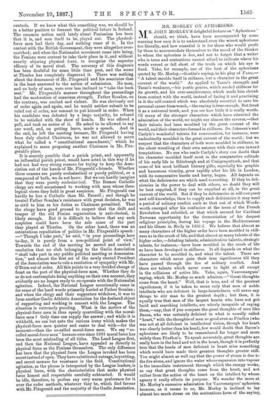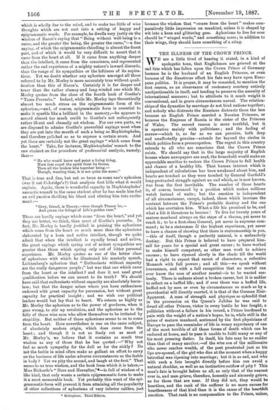MR. MORLEY ON APHORISMS.
MR. JOHN MORLEY'S delightful lecture on "Aphorisms" should, we think, have been accompanied by some warning how easy it is to understand even the wisest aphorisms too literally, and how essential it is for those who would profit by them to accommodate themselves to the mood of the thinker to whom the aphorism is due, and not to forget that a writer who is terse and sententious cannot afford to indicate where his words exceed or fall short of the truth on which his eye is fixed. Take, for example, one of the best of the aphorisms quoted by Mr. Morley,—Goethe'a saying, in his play of Tusso,-- " A talent moulds itself in stillness, but a character in the great current of the world." As applied to Tasso's strength and. Tasso's weakness,—his poetic genius, which needed stillness for its growth, and his over-sensitiveness, which made him shrink from contact with the world, instead of facing it and practising in it the self-control which was absolutely essential to save his personal career from wreck,—the saying is true enough. But treat it as a universal truth, and you see how little it is really worth; Of many of the stronger characters which have attracted the admiration of the world, we might say almost the reverse,—that their talents had been moulded by the great current of the world, and their characters formed in stillness. Dr. Johnson's and Carlyle's wonderful talents for conversation, for instance, were undoubtedly moulded in the great current of the world ; but we suspect that the characters of both were moulded in stillness, in the silent wrestling of their own natures with their own inward' temptations. No one who reads Carlyle's story can doubt that his character moulded itself most in the comparative solitude of his early life in Edinburgh and at Craigenputtock, and that some of his most brilliant literary gifts, especially his graphic and humorous vivacity, grew rapidly after his life in London, with its comparative bustle and hurry, began. All depends on what the deficiencies are which need correcting. If they be defi- ciencies in the power to deal with others, no doubt they will be best supplied, if they can be supplied at all, in the great current of the world. But if they be deficiencies in self-conquest. and self-knowledge, then to supply each deficiencies it may need- a period of solitary conflict each as that out of which Words- worth emerged after his confusion at the issue of the French Revolution had subsided, or that which secured for Cardinal Newman opportunity for the fermentation of his deepest religions principles, daring his voyage in the Mediterranean and his illness in Sicily in 1832-3. We believe that almost as many characters of the higher order have been moulded in still- ness as in the crush of life, and that almost as many talents of the higher order,—debating talents, administrative talents, strategic talents, for instance,—have been moulded in the crush of life as have been developed in stillness. It all depends on what the character to be moulded is, and what the talent. There are characters which never gain their tree significance till they have passed through the fire of solitary conflict. And there are talents which never come to light at all except in the collisions of active life. Take, again, Vauvenargnes' saying, which Mr. Morley so much admires,—" Great thoughts come from the heart." Well, that is true, and of the greatest significance, if it be taken to mean only that men of noble intellects who are deficient in large-heartedness will never say things to stir man to the greatest depth ; but then, it is equally true that men of the largest hearts who have not gob lucid and searching intellects, are utterly incapable of saying them,—nay, that if you compare the great thoughts of men like Bacon, who was certainly deficient in what is usually called " heart," with the thoughts of men as good even as Fdnelon ( who was not at all deficient in intellectual vision, though his heart was clearly better than his head), few would doubt that Bacon's aphorisms are likely to be remembered far longer and more widely than Fanglon's. To speak accurately, great thoughts are really born in the head and not in the heart, though it is perfectly true that the heads of men deficient in heart miss something which would have made their greatest thoughts greater still. You might almost as well say that the power of steam is due to. the fire alone, and ignore the water whose expansion into vapour is the immediate instrument through which the energy works, as say that great thoughts come from the heart, and not rather from the action of the heart on the intellect by whose agency it really effects its purpose. We wonder the more at Mr. Morley's excessive admiration for Vauvenargues' aphorism. because, as it seems to us, Mr. Morley is inclined to lay almost too much stress on the sententious form of the saying. which is wholly due to the mind, and to make too little of wise thoughts which are not cast into a setting of happy and epigrammatic words. For example, he dwells very justly on the wisdom of Bacon's saying that " Being without well-being is a curse, and the greater the being, the greater the curse,"—a fine saying, of which the epigrammatic chiselling is almost the finest part, and of which it would be very diffioult to assert that it came from the heart at all. If it came from anything deeper than the intellect, it came from the conscience, and represented rather the sad experience of a mighty nature's inward discords, than the range of its sympathies or the loftiness of its aspira- tions. Yet we doubt whether any aphorism amongst all those referred to by Mr. Morley is more accurately true without quali- fication than this of Bacon's. Certainly it is far deeper and truer than the rather clumsy and long-winded one which Mr. Morley quotes from the close of the fourth book of Goethe's "Tame Proverbs." Indeed, while Mr. Morley lays theoretically almost too much stress on the epigrammatic form of the aphorism,—and, of course, epigrammatic form is essential to make it sparkle like a brilliant in the memory,—he appears to accord almost too much credit to Goethe's not nnfrequently rather ill-cut and clumsily set wisdom. For our own parts, we are disposed to admire Goethe's proverbial sayings most when they are put into the mouth of such a being as Mephistopheles, and therefore polished so as to express a certain scorn. And yet these are certainly not the great sayings " which come from the heart." Take, for instance, Mephistopheles' remark to the raw student on the procedure of professorial analysis, namely, that-
" He who would know and paint a living thing, Must first expel the spirit from its frame, Then all the broken bits together bring,— Though, wanting that, it is not quite the same."
That is true and fine, but not so terse as some one's aphorism (was it not Coleridge's ?) that analysis first kills what it would explain. Again, there is wonderful sagacity in Mephistopheles' sarcastic remark to the same student after he has made him feel an evil passion thrilling his blood and stirring him into excite- ment :—
"Grey, friend, is Theory,—true thoogh Theory be,— And green the foliage of Life's golden tree."
These are hardly sayings which come "from the heart," and yet they are better, we think, than most of Goethe's proverbs. In fact, Mr. Morley is hardly justified in praising the aphorisms which come from the heart so much more than the aphorisms elaborated by a keen and active intellect, though we quite admit that when the intellect is equally broad and active, the great sayings which spring out of ardent sympathies are greater than those which spring only out of bitter personal experience. Mr. Morley quotes as one of the better class of aphorisms with which be illustrated his masterly speech, Lichtenberg's aphorism that " Enthusiasts without capacity are the really dangerous people ;" bat was that one which came from the heart or the intellect ? and does it not need great qualification before we can assent to its truth P We should have said that enthusiasts without capacity are absolutely harm- less ; but that the danger arises where you have enthusiasm endowed with great capacity for persuasion, but without great capacity for practical insight ; and we wish our political leaders would but lay that to heart. We esteem as highly as Mr. Morley the aphorism as to the power of goodness, when it goes wrong, to stir up revolution, and the aphorism as to the folly of those wise men who allow themselves to be irritated by stupidity. But neither of these aphorisms seems to us to come from the heart. Here nevertheless is one on the same subject, of absolutely modern origin, which does come from the heart ; and though it ie not eo finely cut as most of Mr. Morley's, we believe that it contains as mach true wisdom as any of those that he has quoted :—" Why not feel as much sympathy for the dull as for the sickly P Do not the feeble in mind often make as gallant an effort to carry on the business of life under adverse circumstances as the feeble in body P Yet we pity the second, and laugh at the first." That seems to us true wisdom, and the book from which it is taken,— Miss Rickarde'e " Here and Hereafter,"•—is fall of wisdom of a like kind, that only wants a certain epigrammatic form to make it a most memorable book. Yet probably this want of the epi- grammatic form will prevent it from attaining all the popularity of other collections of aphorisms of very inferior calibre, just
• 8411000ms. Third Edition.
because the wisdom that "comes from the heart" makes com- paratively little impression on mankind, unless it is shaped by wit into a keen and glittering gem. Aphorisms to live for ever should be " winged words," and something more; in addition to their wings, they should have something of a sting.
























































 Previous page
Previous page